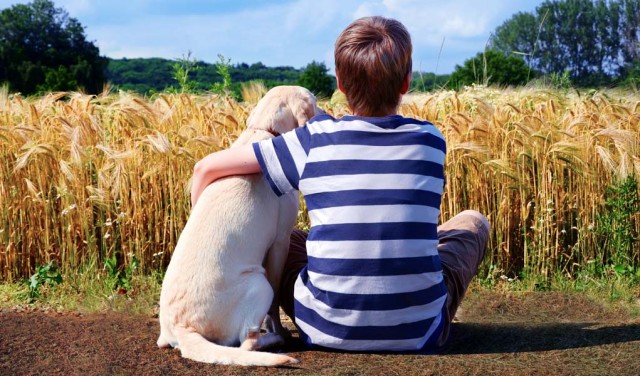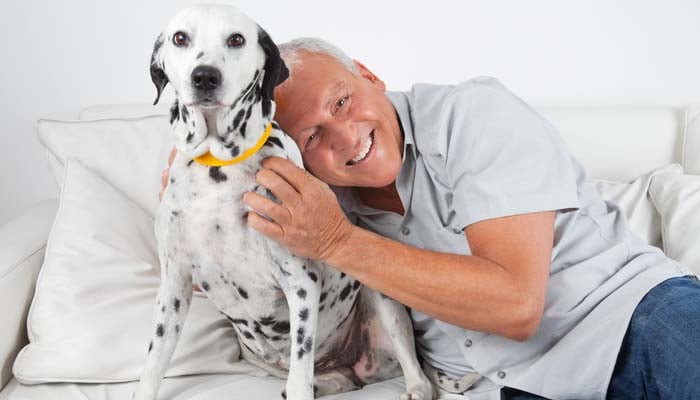
Table of Contents
So you’re dreaming of a furry companion with four legs, a wet nose, and a wagging tail, but mom and dad need to give their approval first? Or maybe you’re living on your own, but want to know how to convince your parents to get a dog because he'd be a good companion for them to have around?
Regardless of the agenda, the goal is clear: you need a list of good reasons of why getting a dog would be beneficial, and that would finally convince your parents to adopt a puppy.
I've gone through the same process myself a while ago, so allow me to give you some tips on how to do this properly.
RELATED: 14 Scientifically Proven Cases Where Dogs are Better than Doctors
Now, before you approach your folks for their okay on adopting a dog, you should develop a strategy that doesn’t include holding your breath until you turn blue.
You need to inform yourself about responsible pet ownership, how much owning a dog cost, what it takes to take care of a pet and anything else that's related.
How to Convince Your Parents to Get a Dog
This is where you should start
First, grab your paper notebook or a tablet, and make a quick list of potential objections your parents might raise to your plan once you propose it. To get you started, here’s a short list of common reasons people tend to use when refusing a dog:
- Dogs are too expensive
- Owning a dog is too much responsibility
- Dogs make a mess
- Someone in the household is allergic to dogs
There may be other reasons, some of which can be specific to your situation, so include those as well.
Once you’ve got your list down, start preparing your answers. When trying to find a way how to convince parents to get a dog, you need to know what you’ll say to each of the different reasons from your folks, should they come up. If you have a smart, well thought-out response, it will show that you’ve put some time into considering what it means to have a dog and wanting a dog isn’t just a phase or a passing whim for you.
Below I'll list some reasonable rebuttals for the objections that were listed above.
“Dogs are too expensive”
 It’s true that there are several costs associated with having a dog as a pet. Aside from the initial cost of purchasing or adopting them, dogs need daily feeding, frequent grooming, and regular vet visits.
It’s true that there are several costs associated with having a dog as a pet. Aside from the initial cost of purchasing or adopting them, dogs need daily feeding, frequent grooming, and regular vet visits.
On top of that, there are also the occasional costs such as licensing, buying dog toys and treats, and boarding. However, there are ways to reduce these expenses so that they might fit more easily into your family’s budget. We've talked about pets on budget before, and Samantha has also written a thorough column on the subject very recently.
In almost every case, adopting a shelter dog is going to be cheaper than going to a breeder. Even if you have your heart set on a particular breed, you can usually ask your local shelter to keep an eye open and contact you when that kind of dog is brought in.
You can also search for breed-specific rescue groups. Classified ads online and in neighborhood publications usually have a pet section and you might be able to connect with someone who wants to give their dog away for free to a good home. Here's a good article on where to adopt puppies for cheap.
As far as the day to day expenses of dog ownership are concerned, you might offer to help meet them yourself. If you’re old enough, you could get a job or contribute part of what you’re earning now. If you’re not the right age to go to work, see if your neighbors will let you mow their lawn for a small fee. You could try shoveling snow, dusting, taking out trash, or babysitting if mowing isn’t your thing. There are many different ways to earn the little extra money you need to help take care of a dog financially.
If employment is not an option, see if your parents will let you give up some things you have laying around your room that you don’t want anymore. You can often find resale shops that will take gently used clothing or books and video games in good condition. In most cases, you must be 18 or older to sell these items, so make sure you can enlist the aid of an adult if you’re underage.
You should probably check out some of these articles to have an idea of how much it costs to own a dog, and what type of dog supplies you'll need to provide your pet with:
- Adopting a Puppy? You Will Need These Puppy Training Supplies
- Why and Where to Shop for Wholesale Pet Supplies
- Must Have Dog Supplies Every Dog Owner Should Have
- 10 Types of Dog Supplies to Buy in Bulk
- Top Must Have Dog Training Supplies
“Owning a dog is too much responsibility”
 Canines, of course, are living creatures; you can’t just put them in a box with a wheel like a hamster, or throw them away once you get tired of them.
Canines, of course, are living creatures; you can’t just put them in a box with a wheel like a hamster, or throw them away once you get tired of them.
Your dog will depend on you to give him the right amount of exercise, the best dog food, the proper training, the right health care, and lots of love and affection. Some of these things do cost money, while other aspects of dog ownership are free but require your time and commitment.
Think of how you’re going to juggle the time you spend on school work, chores, and hanging out with friends with what your dog will require. Your parents might want you to propose a schedule that includes dog duties.
For instance, handle your dog's food and water needs each day before going to school and take longer walks with your Fido after dinner. If you have friends who are current dog owners, you can combine your time with them with dog related activities like frisbee or fetch. This way you'll be able to socialize your puppy in the best possible way and have plenty of fun yourself.
Dogs can be a great tool to teach responsibility, which is another reason you can use to your advantage when you're looking how to convince parents to get a dog. Because you have another being depending on you, you will be more likely to consider their needs as well as your own. It's a popular option among couples who often adopt puppies before having a child.
The more time you spend caring for your dog, the better your relationship with the dog will be. Keeping a regular dog feeding and exercise schedule will help you practice time management skills, which are important to have in other aspects of life as well. Again, use this to the advantage of your argument against parents' negative argument.
I believe these articles below will be helpful to someone in your position:
- Outnumbered and Probably Outsmarted
- Dog Abuse: Let’s Fix This, One Dog At a Time
- Sunday’s Recap: Dogs and Children
- Serendipity and Dogs
- Why Some Dogs Dislike Men and What To Do About It
“Dogs make a mess”
 There are some aspects of dogs that are indeed messy. They can sometimes be clumsy or slobber, and you have to pick up their waste. Some dogs chew things up or get into the trash.
There are some aspects of dogs that are indeed messy. They can sometimes be clumsy or slobber, and you have to pick up their waste. Some dogs chew things up or get into the trash.
On top of that, lots of dogs shed at least a little bit most of the time, and shed a ton at certain points during the year. Most of these things, however, can be avoided with the right amount of preparation, the right choice of breed, and attention to regular care. All you have to do is take care of your dog's grooming needs and you're set.
“Problems” like drooling and shedding can be solved simply by picking a breed of dog that doesn’t have these issues, although there is no true shed-free dog. Shorthaired dogs usually shed less than longer, thicker haired dogs. A few breeds, like Poodles, Shih Tzus, and Portugese Water Dogs shed the least.
Dogs with loose lips, like Basset Hounds and Saint Bernards, tend to drool much more than breeds like German Shepherds and Australian Cattle Dogs. Once you’ve got a few breeds in mind, do some Googling to see what characteristics are common to your breed of choice, and familiarize yourself with potential issues.
Before you bring a dog into your home, it’s important to do a round or two of “dog proofing.” This means going through your house and identifying any potential hazards that could affect your new pet. Items that are easily breakable should be secured out of reach. Here's a good article on how to housetrain a dog in three easy steps.
Remember to take care of trash cans. They should have lids on, or be put inside a closet or garage, at least until you can train your dog to stay out of them. Going through this process not only helps keep your family’s belongings in good condition, but helps keep mess to a minimum.
Waste and destructive behavior can be handled by proper dog training and regular care. A dog can be trained, for instance, to use the bathroom only in one part of your yard. Or, you can train your pooch to eliminate when you take him or her for walks and can quickly and easily use a plastic bag to clean up. Take a look at some of the columns linked to below for more information on housebreaking a dog and training him properly.
Chewing things like the furniture or your dad’s new slippers won’t do anything to earn browny points with your folks. That’s why your dog needs to be trained to restrict its chewing to pet toys and raw hides for dogs, and why you’ll need to make sure you’ve got these items available.
You'll probably want to adopt a puppy. In that case, you should know that puppies in particular are notorious for their nasty chewing habits. Usually, this behavior develops because new teeth are coming in. You can get some good puppy chew toys, but this doesn't relieve you from the responsibility of watching over them while they're young.
If you’re not prepared to go through the training process with a puppy, consider adopting an older dog. In most cases, older dogs linger at shelters longer and don’t get as much of a chance to find homes as younger dogs do. But, an older dog might already have a lot of training, which could save you time and energy.
The old adage, “You can’t teach an old dog new tricks,” isn’t really true. Senior dogs are also characteristically mellow, which could be good if you have infants or elderly individuals in your home. Your parents may also consider this as a pro when you're looking for ways how to convince your parents to get a dog.
Below, I'll list a few more important articles for you to look over on dog adoption and care:
- Adopting A Dog That Fits Your Lifestyle
- Buying Pet Store Puppies
- Is Your Dog a Gambling Addict?
- Responsible Dog Breeding
- 25 Most Common Dog Behavior Problems
“Someone has dog allergies”
 While it may seem like an insurmountable issue at first, even this problem can be tackled. First of all, just as there are dogs of certain breeds that shed very little, there are certain breeds that cause very few allergic reactions in people. The term for this is “hypoallergenic dogs.”
While it may seem like an insurmountable issue at first, even this problem can be tackled. First of all, just as there are dogs of certain breeds that shed very little, there are certain breeds that cause very few allergic reactions in people. The term for this is “hypoallergenic dogs.”
Before we go any further, allow me to make something clear that I believe it's important to know for all aspiring dog owners trying to convince parents to get a dog. Just as there are no 100% shed-free dogs (which used to be a myth), there's also no 100% hypoallergenic dogs, which is also a current myth. Dog shedding is related to dog hair, and dog hair is related to allergies in people.
With that out of the way, certain dog breeds are definitely better for people with allergies when compared to some other breeds. For example, the American Hairless Terrier, Bichon Frise, Maltese, and Standard Schnauzer are all breeds that fit the description of a hypoallergenic dog.
Depending on how severe a person’s allergies are, there are various ways to treat them. If the person only has a reaction to direct contact, the solution might be simply to wash hands after playing with the dog. If the allergy is intermittent, over the counter medications might address the problem.
More serious dog allergies should, of course, be discussed with a doctor. Often, a simple allergy shot will keep symptoms away. However, if there's a chance that a dog would cause any type of severe allergy reactions in people around your household, this would probably not work to your advantage when trying to find a way how to convince your parents to get a dog. In that case, try to find the breed that will cause the least amount of allergy reactions.
Last few articles I'd like to recommend for you to read before going into this argument:
- 5 Ways to Minimize Shedding in Dogs
- The Shedding Saga: Getting Dog Hair OFF Furniture
- Best Dogs for Allergies and Allergic People
- List of 5 Best Shed Free Dogs
- Ten Best Books for Dog Owners with Kids
Final considerations
Finally, in addition to the points I have made above, try to keep some general strategies in mind when going into this argument with your parents about adopting a dog:
- The more research you can do, the better. Talking with dog owners you know and asking questions at your local animal shelter can both add to your collection of speaking points. Write all your arguments down and remember them well.
- Make an effort to stay calm and reasonable. Hearing “no” from your parents can be frustrating and even make you angry, but having a temper tantrum is practically guaranteed to turn your parents off to any further discussion on the topic.
- Take the time to really listen to what your parents’ concerns are. The more you know about their thoughts on dog ownership, the better you can present them with solutions. Preparing in advance can win you some important points.
- Be understanding and an adult about it. If your parents do say no to bringing a dog into the family, it’s not the end of the world. Maybe conditions are just not right at the moment and somewhere down the line, things will change. You may also be able to volunteer to work with dogs in your spare time.
Dog ownership can be a very rewarding experience and there are thousands of dogs who need forever homes. They can be good protection and an incentive to exercise. They can be great therapy, great working animals, and great friends.
However, getting a pet canine companion should be considered a serious commitment and requires plenty of thought and preparation. With some careful research, patience, and a positive attitude, you can present your parents with a winning case and convince them that being dog parents is just as much fun as being yours.














